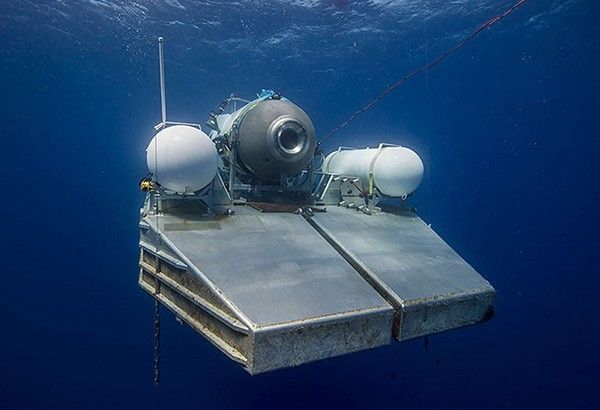French deepsea diving robot arrives near Titanic wreck

PARIS, France — A French research ship equipped with an unmanned robot able to search deep under water arrived near the wreck of the Titanic on Thursday to join a massive search and rescue operation for a missing submersible.
With just hours of oxygen believed to be left for the five people onboard the submersible Titan, the Atalante ship has begun operations at the scene in the North Atlantic, the French Research Institute for Exploitation of the Sea (IFREMER) said.
The ship, which is operated by IFREMER, and its team were urgently dispatched from France on Tuesday.
It carries the Victor 6000, a remotely operated underwater vehicle (ROV) capable of descending to a depth of 6,000 meters.
The Titanic wreck sits at a depth of 3,800 meters, making it a particularly difficult area to search — or reach for a potential rescue mission.
The Atalante has begun using its multibeam echo sounder to create a map of the nearby seabed to "allow Victor 6000 to have a more efficient dive," an IFREMER spokesperson told AFP.
But the echo sounder, which bounces acoustic waves off the seafloor to work out its depth, would not be able to detect the submersible itself, the spokesperson added.
The tourist submersible Titan began its descent towards the wreck on Sunday, losing contact with its support ship on the surface two hours later.
It was carrying British billionaire Hamish Harding, Pakistani tycoon Shahzada Dawood and his son Suleman, the CEO of the company OceanGate Expeditions Stockton Rush, and French submarine operator Paul-Henri Nargeolet.
Based on the sub's capacity to hold up to 96 hours of emergency air, rescuers estimate that the passengers may run out of oxygen on Thursday.
'Doesn't look good'
Rob Larter, a marine expert at the British Antarctic Survey, told a press conference on Thursday that he thought the Victor 6000 was the "main hope" for an underwater rescue.
Alistair Greig, a professor of marine engineering at University College London, said the robot's two manipulator arms could potentially allow it to untangle the Titan, or attach a device that could float it to the surface.
The Victor 6000 also has strong lights, allowing to see through some of the murk at such depths.
But the experts warned that the rescuers would need to know fairly precisely where to look for Titan, which currently does not seem to be the case.
Finding the submersible "could potentially take weeks of intense survey," Larter warned.
And even if search teams do find the submersible, a rescue operation could take up precious time.
In a normal situation, it would take two hours for a ROV like the Victor 6000 to get down to the necessary depth — and another two hours to float back up, Greig said.
The missing submersible is also reportedly bolted from the outside, which could take up more time, he added.
Larter said it was a "desperate situation."
"It's kind of unimaginable if people are alive, trapped in a submersible with oxygen supplies running down.
"An objective assessment of where things are at the moment: it doesn't look good," Larter said, adding that it was important to stay optimistic.
IFREMER has said that the Victor 6000 was able to operate throughout the night if necessary.
The search and rescue operation is being coordinated by the US Coast Guard, which will hold a press conference at 1830 GMT on Thursday, the IFREMER spokesperson said.
RELATED: Inside Titan sub: Past passengers recall 'suicide mission' to visit Titanic wreck




















